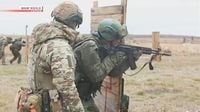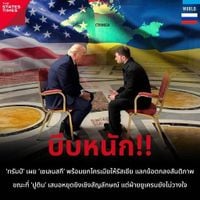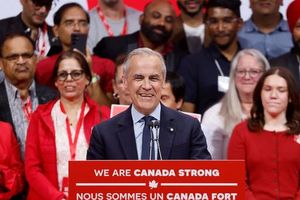As tensions escalate in Eastern Europe, the ongoing conflict between Ukraine and Russia has drawn the attention of global leaders, particularly former U.S. President Donald Trump. In a recent interview with The Atlantic, Trump warned that Ukraine might face significant defeat unless it agrees to negotiate with Russia. He expressed his belief that the ongoing conflict would not yield positive results for Ukraine, stating, "I think I am helping to protect this country. I think this country will be crushed in a short time." Trump emphasized Russia's military strength, urging Ukraine to recognize the reality of the situation.
On April 28, 2025, Trump reiterated his stance during a press briefing, where he also mentioned that Ukrainian President Volodymyr Zelenskyy might be willing to cede Crimea to Russia in exchange for peace. This assertion comes despite Zelenskyy's previous firm denials regarding any territorial concessions. Trump called on Russian President Vladimir Putin to cease hostilities and to finalize a peace agreement within two weeks, reflecting a sense of urgency in the diplomatic discussions.
Amid these developments, the Russian government announced a temporary ceasefire from May 8 to May 11, coinciding with the celebration of Victory Day, which marks the defeat of Nazi Germany in World War II. The Kremlin described the ceasefire as a humanitarian gesture, expressing hope that Ukraine would reciprocate. However, Ukraine's government responded immediately, stating there was no reason to wait for the ceasefire to begin and urging an immediate halt to hostilities for the sake of civilian lives rather than for a parade.
U.S. officials have grown increasingly frustrated with the stalled negotiations between Washington, Moscow, and Kyiv. Senator Marco Rubio has warned that the U.S. might withdraw from talks if no progress is made. On the other hand, Russia has indicated its readiness to engage in peace talks, offering guarantees for a permanent resolution to the conflict. However, Moscow has rejected proposals for a temporary ceasefire, citing past experiences where Kyiv and its Western supporters took advantage of such pauses to resupply Ukrainian forces.
In the midst of these diplomatic maneuvers, Ukraine's President Zelenskyy has praised the efforts of the Ukrainian intelligence agencies for their role in eliminating high-ranking Russian military officials since the onset of the full-scale war. On April 28, Zelenskyy commended the Security Service of Ukraine (SBU) for its achievements, which reportedly include foiling a bombing plot against Russian military leaders. This comes after the assassination of General Yaroslav Moskalik, who was killed by a car bomb in Balashikha, near Moscow, on April 25.
The Ukrainian government has not officially confirmed its involvement in the assassination, although Russian authorities have accused Ukraine of orchestrating the attack. In a Telegram message, Zelenskyy stated, "The head of the foreign intelligence service reported on the elimination of individuals from the high command of the Russian army. Justice will inevitably prevail." This statement underscores Ukraine's commitment to countering Russian military actions.
Meanwhile, the Russian Ministry of Defense released a video showcasing North Korean soldiers participating in combat training exercises alongside Russian troops, a move that highlights the growing military collaboration between the two nations. The footage, which shows North Korean soldiers firing automatic rifles and receiving guidance from Russian military personnel, has drawn attention to the international dimensions of the conflict.
As the situation continues to unfold, the dynamics of the Ukraine-Russia conflict remain complex and multifaceted. With various global actors, including the U.S. and North Korea, playing significant roles, the path to peace appears fraught with challenges. The need for urgent solutions has been echoed by multiple leaders, including U.S. President Joe Biden, who has expressed concern over the escalating violence and its humanitarian implications.
In this context, the future of Ukraine hangs in the balance as it navigates the treacherous waters of international diplomacy, military strategy, and public sentiment. The upcoming days and weeks are critical, as the world watches closely to see whether diplomacy can prevail over conflict or if the situation will further deteriorate.





